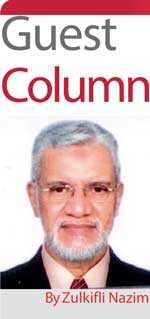Friday Feb 13, 2026
Friday Feb 13, 2026
Wednesday, 29 January 2020 00:00 - - {{hitsCtrl.values.hits}}
“Without freedom of thought and expression I am a slave to the demagogues, preachers and ancient traditions claiming the right to tell me what to think, how to live, what to believe – and that I must not question, but only obey. This is not a full human existence. To be truly free to live, one must be free to think and speak.” – C. Grayling – British Philosopher and Author.
Freedom: who could object? Yet this word is now used to justify a thousand forms of exploitation. In the name of freedom – the freedom of the powerful to exploit the weak, the rich to exploit the poor.
The definition of freedom is, the condition of being free from restraints, but freedom is more than that, freedom is having the right to be me and express myself.
Freedom lets us talk how we want and explain about yourself to be how you want yourself. You can protest for what you believe is right and even if it’s wrong you are able to express it. You can have a religion to follow what you believe in, not what you are forced to believe in. Not being afraid to say what you believe, as well as, get to write how you want and about what you want to write about. 
The freedom of the press – you must have the provision to write entertaining stories or serious stories however you may want to, where you can share them. Without this freedom we would not be ourselves. Every morning we must wake up, not having fears of whether or not we will live that day. We should be confident to act our normal selves. We should have no fear of this and we must be allowed to confidently live our day. It is all of these things that make us who we are, and with the freedom we have fought for, we really can be ourselves. So freedom might just be a word in the dictionary, but to us, freedom is life.
Freedom also means for children to be able to go to school, adults to go to work without being harassed, walk around, and do almost anything without worrying about the safety of oneself and those you love. Technically, freedom means ‘the power or right to act, speak, or think as one wants without hindrance or restraint’. To us and others living here, freedom is their right.
We Sri Lankans also have a penchant for religion and we should be able to practice any religion – Buddhism, Christianity. Hinduism, Islam or any other. We may print or write whatever we want and express ourselves in a decent manner. We can petition, if we feel necessary. We should have the privilege of having whatever job we are qualified for. We cannot be forced to have certain professions. From cradle to the grave, a person’s life chances are dominated by the extraordinary levels of inequality that characterise the modern world.
The extent of global inequality is breathtaking and is shockingly entrenched in our social, political and economic fabric. Today, the income of the world’s 2,153 billionaires have more wealth than the 4.6 billion people. The 22 richest men in the world have more wealth than all the women in Africa. In Sri Lanka the wealthiest 20% of the population account for over 52% of the nation’s income while the poorest 10% account for only 2%. The world as a whole is far more unequal than any single country. Such grotesque unfairness would probably precipitate social and political meltdown were it to occur within a single country and it is happening world-wide.
Our broken economies are lining the pockets of billionaires and big businesses at the expense of ordinary men and women. The wheels of our economies, businesses and societies are mostly driven by women who often have little time to get a useful education, earn a decent living or have a say in how our societies are run, but unfortunately they are trapped in the dungeons of economy.
Freedom is not just a word. With freedom we should be able to choose our own moral compass, make our own decisions. Freedom to us means no one rules our life. We have an amazing inherent privilege to have freedom. Being free means we should have the privilege to marry and lead decent lives with whoever we want. There is equality and equity, because we are free. Being free is a beautiful thing. People always say it’s good to put “your feelings into words.” But is it true? If you think about it, the advice seems somewhat counterintuitive. If you are anxious, scared, or worried about something, is it really going to make you feel better to dwell on this anxiety by speaking or writing about it? Think, reflect and ponder.
Freedom and judicial usurpation by governments
We have come to know that the Chinese government installs software that monitors and censors on certain anti-government websites. Journalists and human rights defenders from Bahrain to Morocco have their phones tapped and their emails read by security services. Facebook takes down wall posts after States complain of ‘subversive material’. Google hands over user data to law enforcement authorities that include IP addresses, location data and records of communications. The US government conducts mass surveillance of foreign phone and internet users.
 |
| The definition of freedom is, the condition of being free from restraints, but freedom is more than that,freedom is having the right to be me and express myself |
Each of these acts threatens both an individual’s freedom to express themselves, and their right to maintain a private life and private communications. Physical or online surveillance, monitoring of communications or activities, State intrusion into private, family or home affairs – prevent an individual from exercising their true freedom of expression. This is actually infringements on the right to privacy.
We could previously communicate with our friends and colleagues without it being known to anyone else. We could move around cities, countries and continents and meet with whomever we wished without it being known. We could follow and join groups and movements without having to disclose identities. We could publish and distribute pamphlets, posters, brochures, newspapers and books without knowing the creator, publisher, and reader.
The ability to act without being observed was innate to the act of expression so we benefited from privacy as we expressed ourselves by living our personal, political and professional lives. Most importantly, we believed that these were rights worth protecting, enshrining in constitutions and promoting through advocacy and protecting in law. Freedom of expression is a fundamental human right. It also underpins most other rights and allows them to flourish.
The right to speak your mind freely on important issues in society, express yourself in writing to papers, writing books and journals. Have access to information and hold the powers that be, to account, plays a vital role in the healthy development process of any society.
The lack of access to freedom of expression is a problem that particularly affects the already marginalised – that is, minorities facing discrimination both in developed and developing countries means they are often excluded from meaningful participation in society, and from the opportunity to better their own circumstances. In other words, discrimination is one of the core elements of unequal access to freedom of expression.
Both direct and indirect forms of discrimination must be prohibited by powerful legislation. Direct discrimination occurs when an individual is treated less favourably than another person. Indirect discrimination refers to laws, policies or practices which appear neutral at face value, but have a disproportionate impact on the exercise of rights as distinguished by prohibited grounds of discrimination.
Unless and otherwise we uphold the principles of human dignity, equality and equity and recognise that democratic and participatory governance based on the will of the people, assures the right to live a life in dignity, free from hunger and free from fear of violence, oppression or injustice, and in pledging to the principle of equality, where no individual is be denied the opportunity to benefit from development, then we can say that we are on the path to freedom.
Let us find some solace in this great saying: “A gem cannot be polished without friction, nor a man perfected without trials” – Seneca-Roman Stoic Philsopher and Statesman.